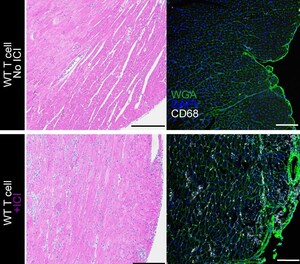
CINCINNATI, Nov. 17, 2011 /PRNewswire-USNewswire/ -- New research in Developmental Cell suggests that increasing expression of certain developmental genes at precise times in the uterus might improve pregnancy rates from in vitro fertilization-embryo transfers (IVF-ET), which remain low at around 30 percent.
(Logo: http://photos.prnewswire.com/prnh/20110406/MM79025LOGO)
Conducted by researchers at Cincinnati Children's Hospital Medical Center, the study was posted online by journal Nov. 17 ahead of print publication.
Researchers point to the genes Msx1 and Msx2 – which play integral roles in organ formation during fetal development – as essential to ensuring the uterus is in a receptive phase needed for successful embryo implantation. Compromised uterine receptivity is a major cause of pregnancy failure in IVF programs, according to Sudhansu K. Dey, PhD, director of the Division of Reproductive Sciences in the Perinatal Institute at Cincinnati Children's.
Babies successfully conceived through IVF have a higher risk of being born prematurely, which can result in a number of potential short and long term health risks for the child. Identifying essential molecular signaling pathways at critical stages of early pregnancy in IVF patients could lead to new approaches for optimizing pregnancy outcome.
"Our findings raise the possibility that clinicians may be able to develop new strategies to improve implantation rates in IVF programs by temporarily increasing uterine levels of Msx," says Dey. "This could allow clinicians to potentially extend the window of uterine receptivity and grant transferred embryos more time to implant."
Through a series of experiments using genetically engineered mice, the researchers determined the loss of Msx genes is associated with detrimental reproductive consequences in a key molecular signaling pathway involving Wnt signaling. The Wnt pathway plays a central role in embryo development. As a result of Msx loss, uterine luminal epithelial cells respond improperly and fail to assume a slit-like architecture that forms a crypt (nidus) necessary for placing the embryo for successful implantation.
Gene-deleted mice in the study exhibited graded levels of compromised fertility depending on a single or double deletion of the Msx gene. Mice singly deleted of Msx1 produced either smaller than normal litter sizes or no litters at all, while deletion of both Msx1 and Msx2 genes resulted in complete infertility because embryos failed to implant.
Gene analysis has shown that Msx genes are differentially expressed in the uterus during the menstrual cycle in women. This suggests the possibility that genes identified in the current study may have important roles during human implantation.
The present findings also show that Msx genes convey and maintain uterine receptivity without altering ovarian hormone levels or uterine sensitivity to these hormones. Dey and his colleagues believe that, in addition to its potential in improving IVF-derived pregnancy outcomes, further uncovering the role of Msx may aid in the development of non-steroidal contraceptives.
Although further investigation is warranted to apply the findings to human fertility, the researchers say they are a step forward in understanding a molecular network that regulates female fertility and is subject to manipulation.
The study's co-first authors are Takiko Daikoku, PhD, a faculty member in the Division of Reproductive Sciences, and Jeeyeon Cha, an MD/PhD student in Dey's laboratory.
The research was supported in part by funding from: National Institutes of Health, including a training grant from the National Institutes of Child Health and Development and a pre-doctoral National Research Service Award; the Cincinnati Children's Perinatal Institute Pilot/Feasibility grant; a Lalor Foundation Post-doctoral Fellowship, and the Japan Society for the Promotion of Science Fellowship for Research Abroad.
About Cincinnati Children's
Cincinnati Children's Hospital Medical Center is one of just eight children's hospitals named to the Honor Roll in U.S. News and World Report's 2010-11 Best Children's Hospitals. It is ranked #1 for digestive disorders and highly ranked for its expertise in pulmonology, cancer, neonatology, heart and heart surgery, neurology and neurosurgery, diabetes and endocrinology, orthopedics, kidney disorders and urology. Cincinnati Children's is one of the top two recipients of pediatric research grants from the National Institutes of Health. It is internationally recognized for quality and transformation work by Leapfrog, The Joint Commission, the Institute for Healthcare Improvement, the federal Agency for Healthcare Research and Quality, and by hospitals and health organizations it works with globally. Additional information can be found at www.cincinnatichildrens.org.
SOURCE Cincinnati Children's Hospital Medical Center







Share this article